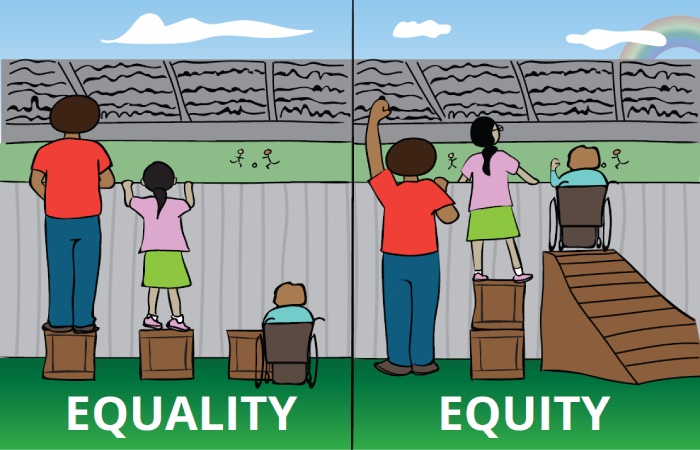Equity is a value that implies justice and equal opportunities between men and women, respecting the plurality of society.
Table of Contents
What is Equity?
Equity is the action of giving each individual. However different they may be, what they deserve or have earned. The word comes from Latin and usually refers, in its translation, to equality. However, both concepts do not represent the same thing. They could even consider in opposition to each other. In this sense, equity tries to promote social justice, where everyone receives what they have earned.
Thus, equity link to social justice. In turn, a judge has the same distribution characteristics as equity.
Types of equity
Different equity types attempt to measure equity based on specific scenarios. For this reason, we must refer to some types since, sometimes, they do not represent the same thing. However, among the types of equity, we can differentiate :
It typically mentions the transgression of the Law, social inequality, and the lack of justice.
Equity in Law and Economics
Within the Science of Law, the value of equity obtains excellent importance. Although it does not reply to one of the sources of Law, it uses as a means or system to correct the Law. Moreover, this tool allows the standard to change to the particular needs of each case. That is to say that the Law applies according to specific circumstances.
That is why it considers one of the essential values of Law since it has a more humane position, if you will, since specific attention take into account. It explains that this has been a much-discussed position since the time of Aristotle
From the Economic Sciences, it is the justice that must apply to treating people’s taxes. It means that tax burdens must vary case-by-case basis to achieve equity.
1. Gender Equality
One of the great struggles that man fights every day is abolishing discrimination against both sexes. Therefore, the fundamental task of gender equality is to offer all people, regardless of their gender, the same opportunities and treatments to guarantee access to their rights and the use of community goods and services.
On the other hand, it is crucial to promote gender equity in different areas, such as education, work, and politics, to give fair treatment to men and women, equal job opportunities, and accessibility to education—health.
2. Social Equity
Social equity, as such, is the application of rights and obligations fairly and equitably to people, irrespective of the social class to which they belong. For example, offer education to individuals without distinction of sex, social class, religion, etc.
Social equity does not intend to eliminate existing differences but to value them and offer equal treatment to overcome existing social inequalities in society.
3. Equity as a Value
Equity as a human value seeks to implement justice and equal opportunities between men and women, respecting the particular characteristics to give each one what corresponds or deserves. For example, a mother will give more attention to her little son because she needs more attention than her enormous son.
It seeks to establish or institute a fair society; as Aristotle says, “equity is Justice applied to the specific case. Many times, the rigorous application of a norm to the cases it regulates can produce secondary effects”.
4. Roman Law
Equity played a fundamental role in the development of Roman Law, which characterizes by formalism, orality, and rigidity, applying arithmetic equality instead of equity.
Roman Law did not extend to all those who lived in the empire, creating many excluded people who could not go to justice. However, with the invasion of Greece by the Romans, there was a syncretization between the two cultures. In addition, to introduce a written law, Greek philosophy influenced the breaking of the rigidity of the Law through the principle of fairness.
Difference Between Equality and Equity

When we refer to the concept of equity, society tends to identify it as a synonym for equality. However, the translation means that it does not mean the same as equality. This sense presents a series of nuances that make both concepts have different meanings.
Therefore, while equality is the action of distributing, in equal parts, in the same proportion, a good, resource, service, etc., on the other hand, equity, however, is the action in which said distribution is made based on the person’s merits. In this sense, if one person deserves more than another, the distribution would not be equal.
For this reason, it tends to be associated more with the concept of justice than with that equality. In this sense, there can be an equitable distribution without this requiring that, in the same way, it be egalitarian.
Importance of Equity
It achieves in various areas of life. For example, in the economic or financial
For example: If a company is in a monopolistic situation, it will have the ability to set the prices of its products or services at will. The government, for its part, must start the necessary conditions for the commercial activity to carry out with equity.
It is also essential to underscore that it is also common to use the concept that concerns us in the field of religion. Exactly, within the scope of the Catholic Church, the principle of it is established, in what would be its Canon Law, to refer to what would be the application of the Law with the vibrant objective that a person can save his soul in an eternal
Examples of Fairness
It is a concept that is presente in many examples. In this sense, we have selected several instances in which the idea of equity could represent it.
- When a man and a woman consume equal opportunities to access a job, it is fair.
- That all children present the same opportunities to study. It is also fair.
- Having worked more than another, a person receives a higher salary. It is also fair.
Conclusion
In short, what equity tries to do is promote equality regardless of gender, culture, or the economic sectors to which each person belongs. It relates to social justice since it protects the same opportunities for all individuals.

